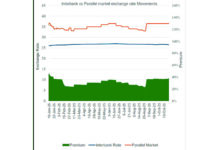ZIMBABWE needs to cut down its huge import bill as part of prerequisite policy interventions to lay a firm foundation for the sustainable reintroduction of an exclusive domestic currency regime, analysts have said.
The country currently operates a multicurrency regime, dominated by the US dollar and Zimbabwe Gold (ZiG), which is set to run until 2030, beyond which there should be the right fundamentals to sustain an entirely domestic currency system.
Zimbabwe is pursuing de-dollarisation to regain control over its monetary policy, which some believe is critical to promote competitiveness, stabilise the economy and determine the country’s desired economic growth rate.
The US dollar, which the authorities have limited control over, presents challenges for policymakers to influence liquidity and growth levels through monetary policy tools such as interest rates.
The Government first reintroduced the domestic unit, the Zimbabwe dollar, in 2019, after a 10-year hiatus, but the efforts achieved limited success, as inflation and currency volatility remained major challenges.
In April last year, the central bank launched ZiG, a gold- and foreign currency-backed domestic currency, which has reduced inflation and stabilised the exchange rate.
According to the central bank, monthly inflation has averaged 0,6 percent between February and July, and is projected to close the year below 30 percent, amid tight monetary and fiscal policy stances.
To create conditions conducive to underpin a domestic mono-currency, Zimbabwe is focusing on macroeconomic stability, improving fiscal discipline, addressing debt burdens, promoting public confidence through transparency and curbing informal trade.
The success of this transition, targeted for 2030, relies on sustained economic growth, effective management of foreign reserves and comprehensive public awareness efforts
Economists argue that a strong import substitution strategy is essential to ease pressure on foreign currency reserves and build confidence in ZiG.
Stockbroking firm FBC Securities noted that, although foreign investment inflows retreated in the past year, the economy remained on a strong footing.
Zimbabwe’s external sector position is still in a surplus due to strong export earnings and diaspora remittances.
However, that cushion remains somehow fragile, with foreign payments for goods and services rising by 17 percent to reach US$5 billion.
Most of the payments were for raw materials, energy and capital goods, underscoring Zimbabwe’s reliance on imports to keep industries running.
Foreign currency reserves have been steadily growing, from US$285 million in April 2024 to more than US$750 million by August 2025. This has allowed the central bank to defend ZiG and shore up confidence in its stability.
Economist Dr Prosper Chitambara said the country’s de-dollarisation road map would be less effective if imports continued to drain foreign currency.
“The de-dollarisation road map should be supported by a robust import substitution framework, reducing pressure on foreign currency reserves,” he said.
“Without boosting domestic production, especially in key sectors such as agriculture, manufacturing and energy, the economy will remain exposed to foreign currency shortages.”
Zimbabwe’s trade deficit figures give a peek into the scale of the challenges that must be dealt with to achieve the desired results.
In 2024, Zimbabwe’s total imports were valued at US$9,53 billion, resulting in a trade deficit of US$2,10 billion. The deficit was US$1,5 billion in 2020, and it widened to US$3,3 billion in 2021, but has narrowed steadily to US$750 million in 2024.
Even so, the volume of imports remains larger than that of exports, leaving the economy in some kind of vulnerable position.
Investment analyst Professor Malcolm Katuruza said the marked increase in reserves to over US$750 million was encouraging, but cautioned that Zimbabwe must not be lured into complacency.
“The growth in reserves is a remarkable step forward, and it demonstrates policy traction,” he said.
“But to make de-dollarisation irreversible, Zimbabwe needs to harness local capacity to produce goods that substitute imports. This requires deliberate policy support, industrial retooling and incentives for firms investing in local value chains.”
He said import substitution was not about closing the door to imports, but about building local industries strong enough to compete globally.
“Through reducing imports of basic goods and some raw materials, the country can save foreign currency for critical investments such as modern machinery and technology,” Prof Katuruza said.
Economist Mr Tinevimbo Shava argued that a notable improvement in domestic production would also build trust in the local currency.
“When people see local industries producing quality goods at affordable prices, their willingness to transact in the local currency grows,” he explained.
“Import substitution is not only about reducing the import bill, but also about strengthening the social contract around de-dollarisation.”
Mr Shava stressed the importance of transparent pricing in ZiG across both public and private sectors.
“Pricing in the local currency will anchor confidence and prevent speculative behaviour that undermines de-dollarisation,” he said.
Experts further say the country can achieve meaningful import substitution by supporting industries that use local raw materials, boosting farmers’ activities through mechanisation and irrigation, and ensuring reliable energy production so that less imports of electricity and fuel are required.
Government policy could also enforce more local procurement by State institutions and parastatals, while banks and development funds could channel capital to small and medium enterprises producing for the domestic market.
Minerals such as gold, platinum and lithium continue to anchor export earnings. However, economists say the country must broaden its export base.
Prof Katuruza suggested: “Agricultural exports beyond tobacco, processed foods, textiles and even ICT (information and communication technology) services should be nurtured. That diversification will allow the economy to sustain reserves while lessening exposure to commodity price volatility.”
Against this backdrop, Finance, Economic Development and Investment Promotion Minister Professor Mthuli Ncube has argued that Zimbabwe must embrace a 24-hour economy to complement these reforms.
Speaking at the 4th Zimbabwe Economic Development Conference (ZEDCON) in Bulawayo, he said the current eight-hour work culture limited productivity at a time when electricity supply is underutilised at night.
“We need a 24-hour economy. Overnight, there is more electricity because the households are sleeping, so it is actually more electricity,” Minister Ncube said.
He argued that sectors such as manufacturing, logistics, healthcare, hospitality and technology could benefit from round-the-clock operations, lowering unit costs and improving competitiveness.
Economists see this as a natural fit for the country’s import substitution drive.
Dr Chitambara noted that industries like food processing and textiles could gain from extended operations, boosting domestic supply and reducing dependence on imports.
Economists agree that, apart from reserves, visible improvements in production, exports and trust are equally vital to anchor ZiG.
“De-dollarisation without import substitution is a half measure. To secure the stability of ZiG, we must produce more, consume local and preserve our hard-earned foreign currency,” said Dr Chitambara.
If Zimbabwe can successfully combine de-dollarisation with deliberate import substitution and support it with productivity-boosting measures like a 24-hour economy, the country could set itself on a more sustainable path, gradually building a stronger, more resilient local currency.











